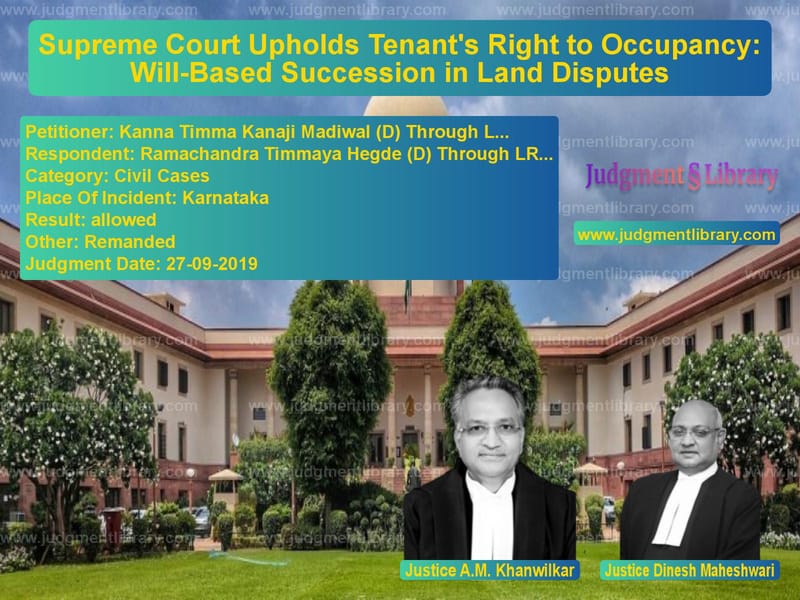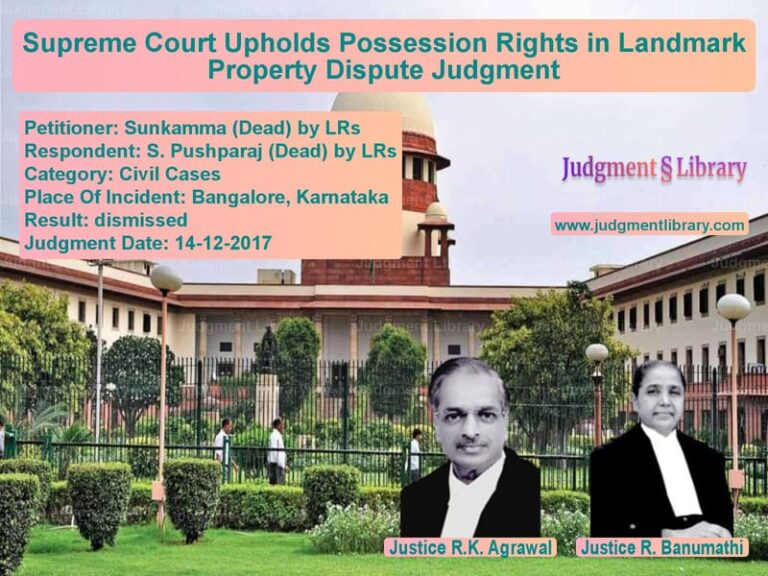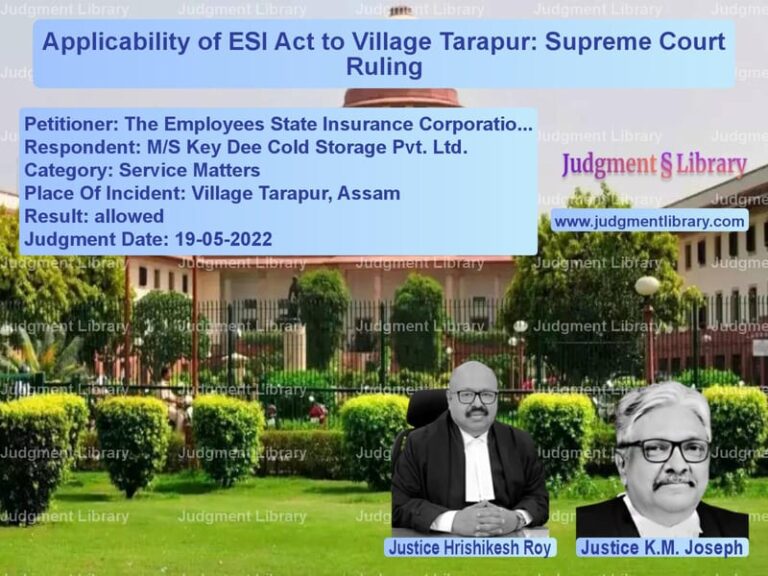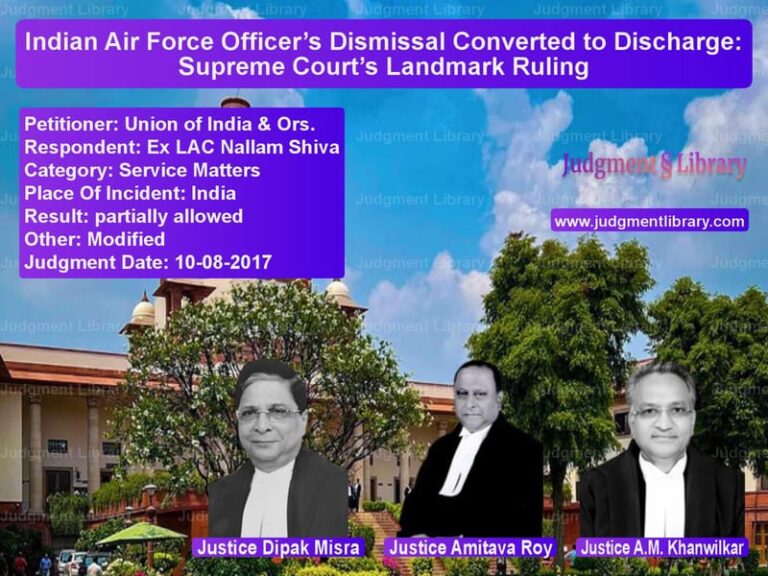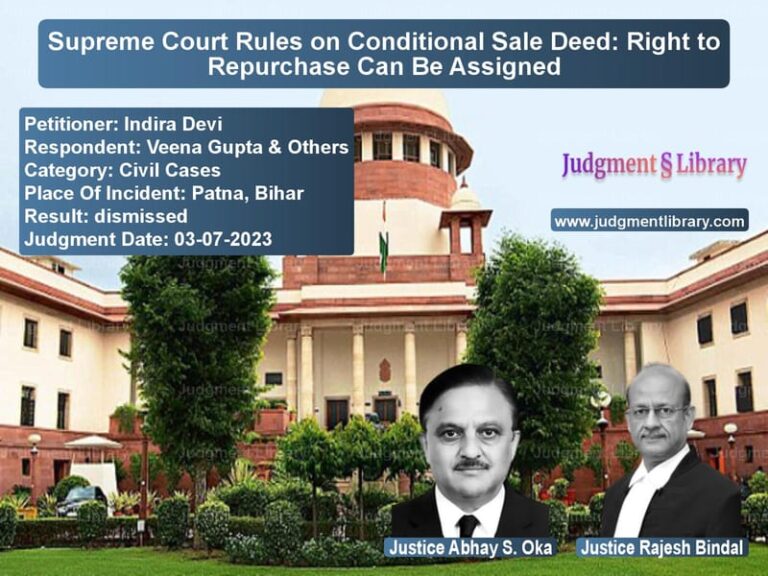Supreme Court Upholds Tenant’s Right to Occupancy: Will-Based Succession in Land Disputes
The case of Kanna Timma Kanaji Madiwal (D) Through LRs. v. Ramachandra Timmaya Hegde (D) Through LRs. & Ors. revolved around a prolonged land dispute concerning tenancy and occupancy rights. The Supreme Court had to determine whether tenancy rights could be transferred through a will and if the successor to such tenancy could claim occupancy rights under the Karnataka Land Reforms Act, 1961.
The judgment reinforced that tenancy rights could be bequeathed by a will to a legitimate heir, provided that the legatee had a valid kinship with the original tenant. The Court ultimately allowed the appeal, upholding the legal heir’s right to occupancy.
Background and Key Issues
The dispute originated when the appellant’s father, Timma, sought occupancy rights under the Karnataka Land Reforms Act for agricultural land originally tenanted by his brother, Gutya. The key aspects of the dispute included:
- Whether the tenancy rights of the original tenant, Gutya, could be bequeathed to his brother, Timma, through a will.
- Whether Timma, after Gutya’s demise, was legally entitled to claim occupancy rights over the tenanted land.
- Whether the Karnataka High Court correctly ruled against the appellant by dismissing his claim.
Arguments of the Petitioner (Kanna Timma Kanaji Madiwal & LRs)
The petitioner’s legal heirs put forth the following arguments:
- Gutya executed a will in favor of his brother, Timma, in 1960, granting him tenancy rights over the disputed land.
- Timma had been in cultivatory possession of the land since Gutya’s ill health and subsequent death in 1963.
- The land records from 1963 onward showed Timma as the cultivator and rent payer, reinforcing his claim to occupancy rights.
- Gutya’s wife, Gauri, had remarried and was no longer a legal heir, as established in prior civil litigation.
- The Karnataka High Court erred in ruling that tenancy rights could not be assigned through a will.
Arguments of the Respondents (Ramachandra Timmaya Hegde & Ors.)
The respondents, who were the original landlords of the tenanted land, opposed the appeal on the following grounds:
- Under the Karnataka Land Reforms Act, tenancy rights could not be transferred through a will.
- After Gutya’s death, the tenancy rights should have reverted to the landlord.
- The Karnataka High Court correctly applied the law by denying Timma’s claim to occupancy rights.
- Even if a will existed, it could not override statutory provisions governing tenancy succession.
Supreme Court’s Key Observations
The Supreme Court analyzed the relevant statutory provisions, including Section 21 of the Karnataka Land Reforms Act, which restricts the assignment of tenancy rights. The Court referred to its previous rulings in Sangappa Kalyanappa Bangi v. Land Tribunal, Jamkhandi and Jayamma v. Maria Bai, distinguishing between restrictions on tenancy and occupancy rights.
1. Tenancy Rights Can Be Transferred Through a Will
“The deceased tenant can assign his rights only to the heirs noticed in the provision and such heirs could only be the spouse or any descendants or one who is related to the deceased tenant by legitimate kinship.”
The Court held that since Timma was Gutya’s brother and a legitimate heir under Hindu Succession laws, the bequeathal of tenancy rights was valid.
2. Karnataka High Court Misapplied the Law
“The High Court overlooked the fact that the Will in favor of Timma was legally valid and that Gauri, Gutya’s wife, had remarried and lost her claim as a legal heir.”
The Supreme Court held that the High Court’s reliance on Section 21 was incorrect, as it prohibits tenancy assignments to strangers but does not bar inheritance by legal heirs.
3. Prior Civil Litigation Established the Appellant’s Claim
“The trial court had already ruled in favor of Timma, recognizing his legal and possessory rights over the disputed land. The findings in the civil suit had attained finality and could not be disregarded.”
The Supreme Court emphasized that the findings in the civil case were binding and that the appellant’s rights had been wrongly denied by the Karnataka High Court.
Final Judgment
The Supreme Court allowed the appeal, ruling that:
- The appellant had legally inherited tenancy rights through the will executed by Gutya.
- The Karnataka High Court’s judgment was set aside.
- The Karnataka Land Tribunal was directed to grant occupancy rights to the appellant’s legal heirs.
- The respondents’ claims were dismissed.
Impact of the Judgment
The Supreme Court’s ruling clarifies key legal principles regarding tenancy rights and inheritance:
- Legitimate Heirs Can Inherit Tenancy Rights: A will executed by a tenant in favor of a legal heir is valid and enforceable.
- High Courts Must Respect Prior Civil Findings: Judicial decisions in related civil cases must be considered before dismissing tenancy claims.
- Section 21 of Karnataka Land Reforms Act Does Not Bar Inheritance: The provision restricts tenancy transfers to strangers but does not prohibit succession by heirs.
- Occupancy Rights Can Be Claimed by Legal Heirs: A successor to tenancy can claim occupancy rights if they have been in cultivatory possession.
The Supreme Court’s decision ensures that legitimate heirs of tenants are not unjustly deprived of their legal rights and that tenancy laws are applied fairly.
Petitioner Name: Kanna Timma Kanaji Madiwal (D) Through LRs..Respondent Name: Ramachandra Timmaya Hegde (D) Through LRs. & Ors..Judgment By: Justice A.M. Khanwilkar, Justice Dinesh Maheshwari.Place Of Incident: Karnataka.Judgment Date: 27-09-2019.
Don’t miss out on the full details! Download the complete judgment in PDF format below and gain valuable insights instantly!
Download Judgment: Kanna Timma Kanaji M vs Ramachandra Timmaya Supreme Court of India Judgment Dated 27-09-2019.pdf
Direct Downlaod Judgment: Direct downlaod this Judgment
See all petitions in Property Disputes
See all petitions in Landlord-Tenant Disputes
See all petitions in Judgment by A M Khanwilkar
See all petitions in Judgment by Dinesh Maheshwari
See all petitions in allowed
See all petitions in Remanded
See all petitions in supreme court of India judgments September 2019
See all petitions in 2019 judgments
See all posts in Civil Cases Category
See all allowed petitions in Civil Cases Category
See all Dismissed petitions in Civil Cases Category
See all partially allowed petitions in Civil Cases Category

